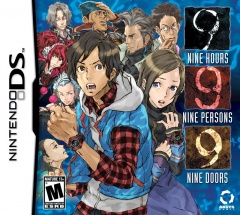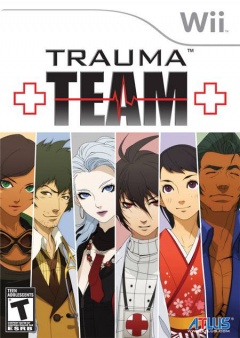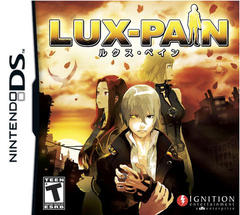visual novel
999: Nine Hours, Nine Persons, Nine Doors
 For the last few years, I’ve been attempting to answer the question “would I keep playing?” after finishing the first hour of a video game. It is kind of a loaded question, as I’m trying to answer for just myself, but also consider the millions of readers out there who might be wondering the same thing. I enjoy genres many people don’t, and I also have wildly varying opinions on a lot of games, so if I’m on the fence, I’ll generally give the game in question the thumbs up. In the end, the wording is important: I would keep playing if I had the time and energy to do so, but chances are I’m still chugging through Dragon Age: Origins.
For the last few years, I’ve been attempting to answer the question “would I keep playing?” after finishing the first hour of a video game. It is kind of a loaded question, as I’m trying to answer for just myself, but also consider the millions of readers out there who might be wondering the same thing. I enjoy genres many people don’t, and I also have wildly varying opinions on a lot of games, so if I’m on the fence, I’ll generally give the game in question the thumbs up. In the end, the wording is important: I would keep playing if I had the time and energy to do so, but chances are I’m still chugging through Dragon Age: Origins.
After a half-hour with the Nintendo DS game 999: Nine Hours, Nine Persons, Nine Doors, I was emphatically done (we sometimes give portable games just the 30 minute treatment with the assumption that being a portable game, they might get things rolling quicker). It was a bizarre experience, to say the least. But then its fans started to comment. Commenters arrive in many forms, sometimes they’re offended that I seemingly insulted their game as if it was their mother, but sometimes they come as defenders of justice. 999 fans appeared as the latter.
So I gave the game another shot, replayed the beginning and on from there. I beat 999 three times in total to achieve the true ending, and in the end, I enjoyed my experience. My final score for the game was hard to pin down, so pay more attention to the text than the number.
Trauma Team
 Classifying video games into genres can be a tricky ordeal. For
example, let's look at Fable.
It's a role-playing game because it uses
dynamic statistics as modifiers to its core mechanics, right? But one of
the
traditional indicators of an RPG video game is that it plays out with
little regard to nuanced player input: its action is menu driven and
often
turn based. Fable's real-time combat, on the other hand, relies on
player dexterity (as in an Action game) as much as it does the
quantifications of the battle engine. So, in our propensity to create
subgenres when things don't fit so neatly, we just call it an Action
RPG. However, it's hard to be satisfied with this conclusion when one
could replace every instance of "Fable" in this paragraph with "BioShock," "Mass Effect," or even "Star Ocean" and it would be no less true, even if all of these
games feel completely different in once you get your hands on the
controller.
Classifying video games into genres can be a tricky ordeal. For
example, let's look at Fable.
It's a role-playing game because it uses
dynamic statistics as modifiers to its core mechanics, right? But one of
the
traditional indicators of an RPG video game is that it plays out with
little regard to nuanced player input: its action is menu driven and
often
turn based. Fable's real-time combat, on the other hand, relies on
player dexterity (as in an Action game) as much as it does the
quantifications of the battle engine. So, in our propensity to create
subgenres when things don't fit so neatly, we just call it an Action
RPG. However, it's hard to be satisfied with this conclusion when one
could replace every instance of "Fable" in this paragraph with "BioShock," "Mass Effect," or even "Star Ocean" and it would be no less true, even if all of these
games feel completely different in once you get your hands on the
controller.
Trauma Center: Under the Knife arrived on the scene in the Nintendo DS launch window, requiring players to perform lightspeed surgeries using a variety of medical instruments through the handheld's touch screen. Ignoring the dearth of surgery games (or even touch screen games) to use as precedent, Trauma Center was still very tough to define. Can we really use the catchall Simulation genre for a game where heart surgery lasts all of a minute and Space Invaders can be found in the patient's lungs? Is it part visual novel merely because operations are bookended and pervaded by character portraits and dialogue? Not content to let us try and figure it out after four games, Atlus' fifth title in the franchise, Trauma Team, complicates things further by providing six different scenarios to play through, each with its own exploration within (and sometimes a bit outside) the traditional Trauma Center structure.
Okay, so I don't really know what to call it. A more important concern, though, is whether or not it's fun. So how did my first hour go with this...whatever it is?
999: Nine Hours, Nine Persons, Nine Doors
 999: Nine Hours, Nine Persons, Nine Doors... what an awful title. I'm not even sure if that is the right title, just look at its cover. Anyways, you're probably wondering what the heck 999 is exactly. Well, it's basically Saw meets Hotel Dusk. A point and click visual novel with bombs implanted into stomachs that will explode if puzzles are not solved quickly enough. Yes, this game really was released and has the Nintendo Seal of Approval on it. And yes, it's rated M for Mature.
999: Nine Hours, Nine Persons, Nine Doors... what an awful title. I'm not even sure if that is the right title, just look at its cover. Anyways, you're probably wondering what the heck 999 is exactly. Well, it's basically Saw meets Hotel Dusk. A point and click visual novel with bombs implanted into stomachs that will explode if puzzles are not solved quickly enough. Yes, this game really was released and has the Nintendo Seal of Approval on it. And yes, it's rated M for Mature.
I don't really know why I chose to try 999 out, I haven't exactly had great luck with visual novels *cough* Lux-Pain *gag* Hotel Dusk *puke*, but the whole premise was just too intriguing to pass up. I figured I would give it a half-hour of my time to see if it was worth it to go on.
999 was developed by Chunsoft, creators of very popular visual and sound novels in Japan, including 428: Fūsa Sareta Shibuya de, one of the not-so-elusive 40/40 Famitsu scored games. They also handle the Shiren the Wanderer series and Pokemon Mystery Dungeon, so they're not exactly slackers. As for 999, well, I'm going to give my opinion on its first half-hour right now.
Lux-Pain
 Lux-Pain is a visual novel game for the Nintendo DS. Novel is an accurate description of this game's length and amount of reading. Lux-Pain took me about 21 hours to read/play through and compared to the other popular heavy reading games on the DS like Phoenix Wright or Hotel Dusk, has much less interactive gameplay and unfortunately, a much less polished translation. Visual novels are a big genre in Japan, but have never really made the transition overseas outside of the Ace Attorney series. Honestly the big difference is that Ace Attorney gets the localization it deserves whereas Lux-Pain's seems rushed and bland.
Lux-Pain is a visual novel game for the Nintendo DS. Novel is an accurate description of this game's length and amount of reading. Lux-Pain took me about 21 hours to read/play through and compared to the other popular heavy reading games on the DS like Phoenix Wright or Hotel Dusk, has much less interactive gameplay and unfortunately, a much less polished translation. Visual novels are a big genre in Japan, but have never really made the transition overseas outside of the Ace Attorney series. Honestly the big difference is that Ace Attorney gets the localization it deserves whereas Lux-Pain's seems rushed and bland.
Anyways, Lux-Pain is not all bad. If you're a fan of this genre and like mysteries, this is probably right up your alley. It has a big story and starts off as a delicious cross between Persona 3, Phoenix Wright, and Heroes. It's a pretty serious game but has some great art and actually tons of voice acting. Lux-Pain offers a lot... if a bit scattered about. Let's get to my full review.
